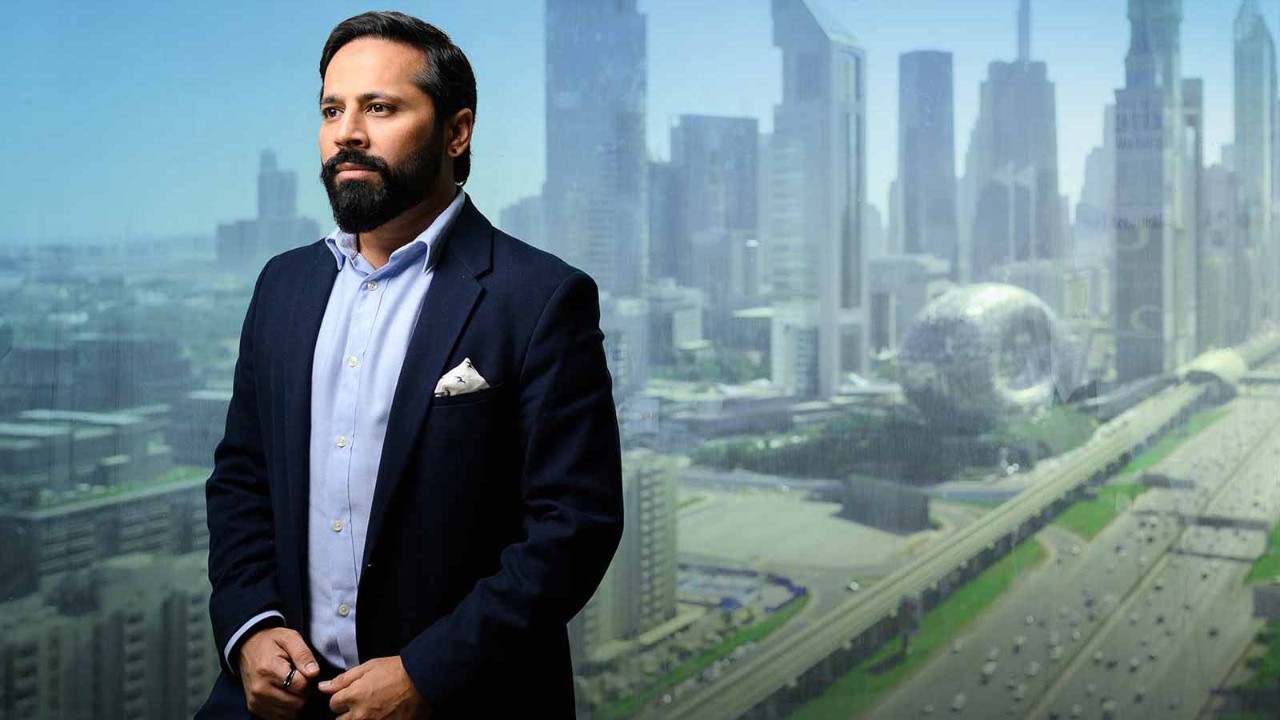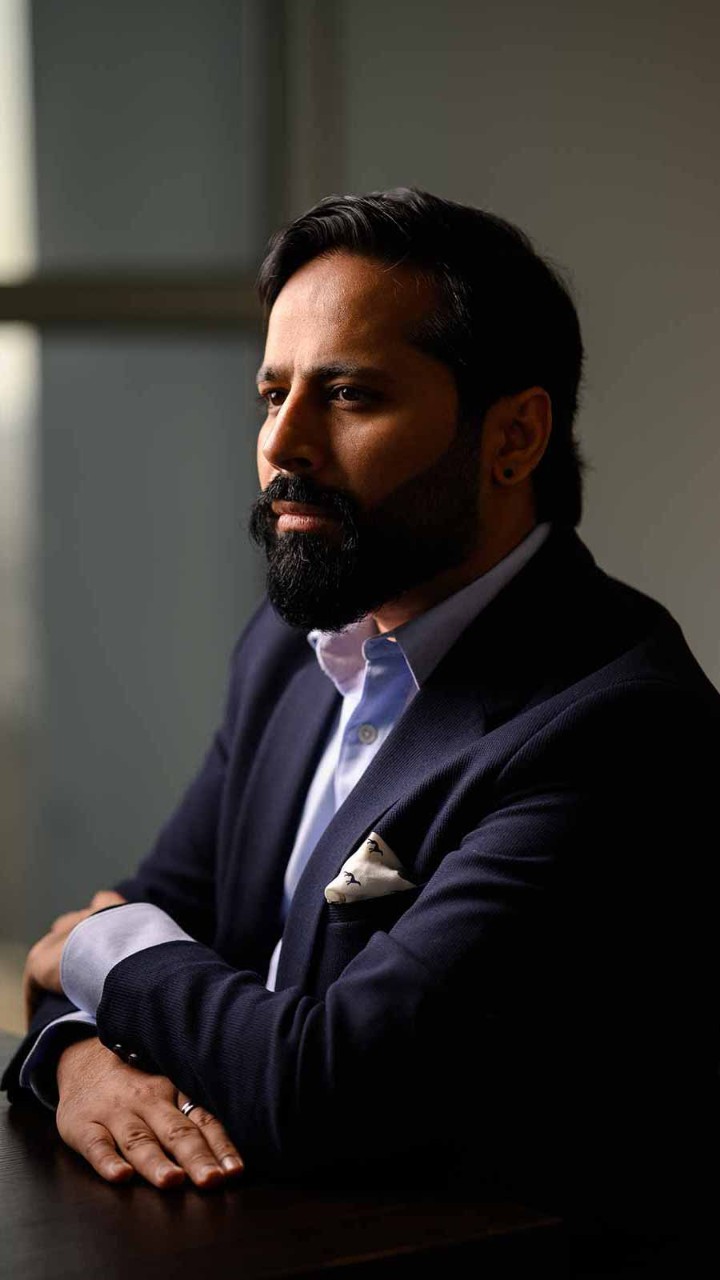
The global CEO of professional services firm AthGadlang, Arshad Gadit ACCA happily splits his time between three countries. With his family in Bahrain, and his work in Saudi Arabia and Dubai, Gadit often drives for six hours to get to his office in Saudi Arabia’s capital. ‘I travel home Thursday evening,’ he explains, ‘and on Sunday morning I drive from Bahrain over a 20km bridge – the King Fahd Causeway – to Saudi Arabia, and then there’s a straight road I drive for 450km to Riyadh.’
A cricket lover and self-confessed ‘travel freak’, Pakistan-born Gadit has visited over 50 countries. The people he’s met and his experiences along the way have helped him become a better adviser, he says, and driven his international ambitions for AthGadlang.
‘The idea is to go global – that’s why my title says global CEO’
‘The idea is to go global – that’s why my title says global CEO,’ he explains. ‘We work in five jurisdictions at the moment – Bahrain, UAE, Saudi Arabia, Oman and the UK, although 95% of our business is in the Middle East – with 130 staff, and we operate four service lines: assurance, accounting, tax and consulting.’
Gadit plans to expand AthGadlang into Qatar and Kuwait – the two Gulf Cooperation Council (GCC) countries the business doesn’t currently operate in – before going global. ‘In five years’ time we want to be a 500-person firm, and in 10 years’ time we want to be one of the GCC’s top 10 firms,’ he says.
‘AthGadlang is an ACCA approved employer, which has helped us source talent’
CV
2020
Global CEO, AthGadlang, UAE
2012
Audit and assurance partner, BDO Bahrain
2005
Audit senior manager, Deloitte UK
2002
Audit supervisor (following a secondment), EY Bahrain
1998
Audit senior, then supervisor, EY Pakistan
Mover and shaker
The firm has six partners, who have all worked for Big Four accountancy firms, and have ‘at least a decade’s experience in the Middle East’. Gadit himself started his professional career in 1998 in Pakistan, became ACCA-qualified in 2000 at the age of 20, and completed his training (and Institute of Chartered Accountants of Pakistan qualification) with EY in 2002.
‘My areas of expertise then were insurance and oil and gas,’ he says. ‘I then moved to EY Bahrain, working with asset managers and investment management firms, and continued there until 2005, when I got an opportunity to work in Deloitte in London.’
Gadit spent seven years in Deloitte UK’s banking and capital markets division, before becoming an assurance partner at BDO in Bahrain. In 2016, he and his partners started AthGadlang in Dubai.
Talent draw
‘I joined AthGadlang full-time in 2020 – at that point, we had 50 staff,’ he recalls. ‘Four of our six partners are ACCA-qualified, and AthGadlang is an ACCA approved employer, which has helped us source talent – we’re sponsoring an event for ACCA in January 2023.’
ACCA’s global network is something Gadit is proud to be part of. ‘I always tout the ACCA as a feather in my cap – that’s how much I respect my professional qualification. I became more active with ACCA when I was considering starting AthGadlang,’ he says. ‘With ACCA’s network and support, I never felt alone.’
Gadit also values his UK experience. ‘The UK has very sizeable and mature markets, and bringing that knowledge back to the Middle East helped significantly, because you’ve seen the full variety of things which could possibly be done. The size of the organisations I was dealing with, the kind of products and professionalism in a mature market that I brought to developing markets like the Middle East – it helped a lot, gives a broader perspective.’
‘People say the Middle East is a relationship-driven culture, but our profession is like that anyway’

But in some ways, Gadit says, the Middle East isn’t that different. ‘People say the Middle East is a relationship-driven culture, but our profession is like that anyway – it’s relationship-based.’
What is different, though, is the firm’s client sectors in each region. ‘In Bahrain, for example, our clients are predominantly in hospitality, healthcare and financial services,’ he says. ‘In the UAE, they are mostly in non-financial services – particularly oil and gas, FMCG, real estate, construction and hospitality.’
Cup winner
The World Cup in Qatar ‘opened up the world to the UAE’, he adds, with Dubai’s tourism sector widely reported to have benefited too as a result. ‘More tourism means more companies want to come and operate in the country. This means more demand for our services, especially new company formations, working with local banks, and accounting, although competition is very high.’
The considerable difference between the UAE’s demographics and economy and those of Bahrain and Saudi Arabia also affects how AthGadlang operates in each region, Gadit says. ‘More so in Saudi Arabia than Bahrain, there are large conglomerates run by single families, really huge family businesses which run the financial system of the country – financial houses, banks and insurance companies. But these groups are multifaceted businesses operating in many different industries, such as aviation, manufacturing and FMCG.’
Future vision
For now, Gadit is based in Saudi Arabia because of the opportunities arising from the country’s Vision 2030 strategic framework, which is built around the three primary themes of a vibrant society, a thriving economy and an ambitious nation. With the Vision opening up Saudi Arabia, consultants are in high demand. ‘It’s all happening here at the moment,’ Gadit admits.
‘The 2030 Vision provides opportunities for companies to go to IPO, so that’s where a lot of our work is coming’
‘Vision 2030 is very broad – it transforms the entire country, taking into account every single thing: infrastructure, education, healthcare, oil and gas, tourism, hospitality,’ he explains. ‘The Saudi market is very liquid at the moment; the Vision provides opportunities for companies to get listed, to go to IPO, so that’s where a lot of our work is coming through the pipeline. If closely run businesses want to go public, we’ll help clients go from A to B.’
Embracing technology is part of AthGadlang’s own vision. ‘We are always eyeing opportunities for digitalisation in our business, because without that we will not be able to compete better than what we do today,’ Gadit says. As a smaller firm, AthGadlang can be ‘more agile, flexible, faster’ in implementing new ideas. One example is a client portal that will house all the firm’s client work, which is expected to be rolled out in the first half of 2023. ‘It’s a huge initiative that I don’t think many firms of our size – if any – have taken yet.’
‘If you always do what you’ve always done, you will always get what you always got’
Many consultants are now basing themselves in Saudi Arabia, but Gadit says AthGadlang is ‘absolutely crystal clear’ about who it wants to work with and has few competitors in its space – unlike in Dubai.
AthGadlang has undoubtedly come a long way. ‘There are 85 people in our Dubai office,’ Gadit says. ‘Our office now is on Sheikh Zayed Road overlooking the Museum of the Future. We started with three desks; today we’re on half a floor – in fact, we’re about to take up the whole 28th floor.’
Looking out over the museum, he is filled with a sense of achievement. ‘We are realising our dream. If people want to do something out of the box, I’d always encourage them to. Because if you always do what you’ve always done, you will always get what you always got.’
AthGadlang in numbers
2016
Year of foundation
130
Number of staff
6
Number of partners
5
Number of countries the firm operates in: the Gulf states of Bahrain, Oman, Saudi Arabia and the UAE, plus the UK

